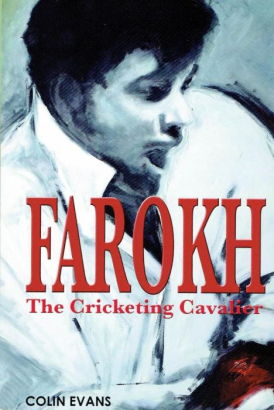Farokh – The Cavalier of Cricket
Martin Chandler |Published: 2017
Pages: 208
Author: Evans, Colin
Publisher: Max Books
Rating: 4 stars

There are some misguided souls who still regard Farokh Engineer as being Indian. Whilst it may be true that Engineer was born in Mumbai, and that he played in 46 Tests for India, no Lancashire cricket fan over the age of 50 will ever accept that he is not every bit a part of the fabric of our county as Chorley Cakes and LS Lowry.
In the circumstances it is fortunate that it is Colin Evans who has written this rather splendid book about our hero. Evans spent his working life as a sporting journalist in Lancashire. He has a polished and entertaining writing style and a previous conviction for writing a book that received a maximum from this reviewer, so no one is better placed to write Engineer’s story. Evans is of course well aware that his subject is a bona fide man of the Red Rose, a subliminal message to that effect coming across loud and clear throughout the book.
Is Farokh – The Cricketing Cavalier a biography? The answer to that must be yes, but not really in the traditional sense. Evans and his subject get on far too well and have known each other too long for the book to be entirely objective, and Evans acknowledges right at the outset that his friend’s stories might have been subject to a touch of embellishment over the years, albeit never with a motive beyond entertaining an audience.
Engineer’s upbringing in India was an interesting one and, possibly, a little unusual? Although perhaps that is one for an Indian to judge rather than a Lancastrian. Very few Indian cricketers of Engineer’s vintage and earlier have been the subject of biographies so it is a tricky one – I will be interested to hear what Evans and our mutual friend Gulu Ezekiel thinks on that one.
Rather easier than his background is Engineer’s cricket. His debut matches saw a first series win for India over a major opponent, England, in 1961/62. His second series however, just a few weeks later, belongs to the bad old days of Indian cricket when, to a side with pace bowlers, India represented easy pickings. Frank Worrell’s men won 5-0, and the win was every bit as convincing as the scoreline suggests.
Through the 1960s the Indian selectors were torn between picking Engineer or Budhi Kunderan as ‘keeper. Kunderan was a decent player, if not quite as good as his rival. Part way through their dominance the selectors turned to a princely interloper Kumar Shri Indrajitsinhji, and after Kunderan fell out of favour Engineer was punished for becoming a Lancastrian by losing his place to Pochiah Krishnamurthy in 1970/71. The selectors rather got away with their follies, Indrajitsinhji keeping in a famous win over Australia, and Krishnamurthy in a first series win in the Caribbean. Unsurprisingly Engineer does not hold back on the subject of his treatment at the hands of selectors.
Once Engineer had become a Lancastrian his story is less reliant on his own input as Evans shared that time with him, and indeed the author cannot resist the occasional autobiographical digression. It is a fascinating story of changing times in the English game in general and in Lancashire in particular. Evans set a high bar for himself on such subjects in Mods and Blockers, and does not disappoint here. Humour abounds in what is essentially a serious story, and I defy any cricket fan not to enjoy reading it. For Lancastrians of a certain vintage the book is indispensable.
One of the most enjoyable aspects of Farokh – The Cricketing Cavalier is its infectious ‘feel good’ factor. Engineer has his moans about selectors and administrators but the abiding and refreshing message is how much pleasure he got from his playing career, wherever that took him. Those one day triumphs with Lancashire and twin series wins over England in the early 1970s are understandably the highlights, but there is plenty more evidence of Engineer being the life and soul of almost everything he was involved in, whether that be cricket, business, family or friends.
The book contains an extensive selection of photographs ranging throughout Engineer’s life. Some are full colour and others the more traditional monochrome, but all are exceptionally well reproduced. A number of the images are well known, but the majority are available for public scrutiny for the first time and are certainly not limited to the game itself. A personal favourite is a shot of Engineer, Mike Winter, Sid James and Freddie Starr in their capacity as judges of one those beauty contests from the 1970s that, thankfully, we no longer see. Unsurprisingly Winter and James look completely at home in their surroundings. Starr, and the more so Engineer, look a little sheepish about their involvement in such an overt display of male chauvinism. That said it is a task Engineer admits to having carried out several times, so I suppose the explanation for their facial expressions might simply be embarrassment on the part of Engineer and Mr Starr at the size of the collars on their shirts.
I have tried hard to be completely objective in giving a rating to Farokh – The Cricketing Cavalier, hence it receives four. I will however add that for Indian supporters that goes up to four and a half, and five for the Lancastrian market.






Leave a comment